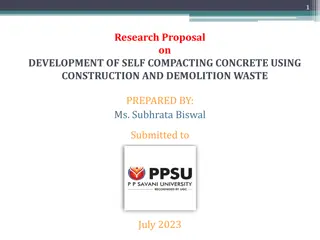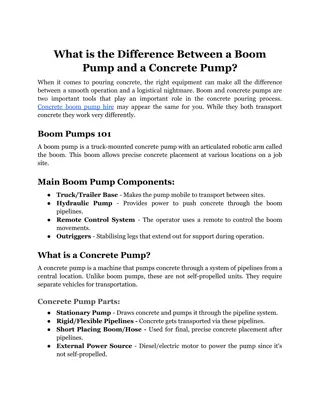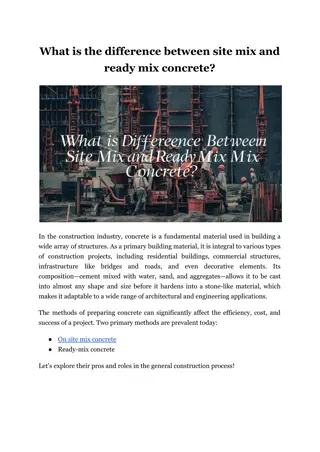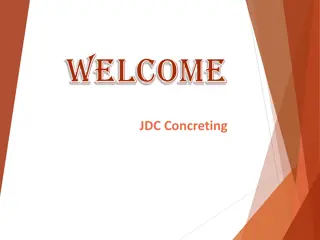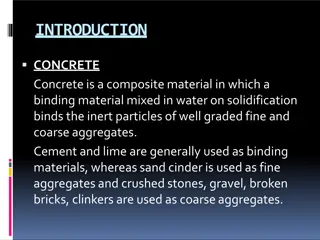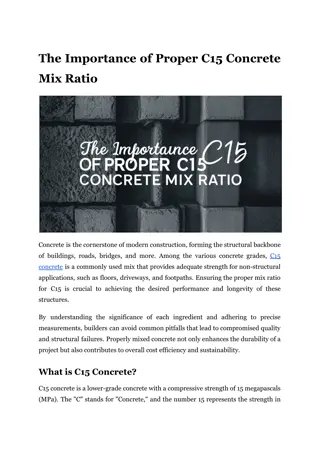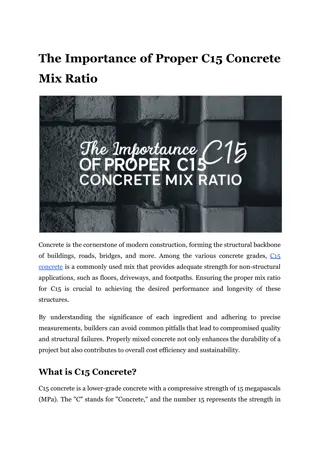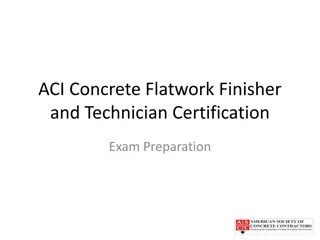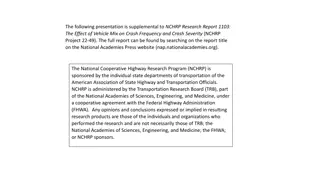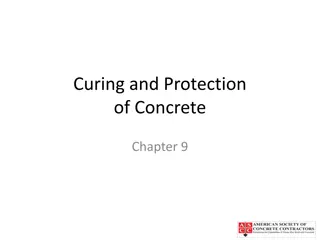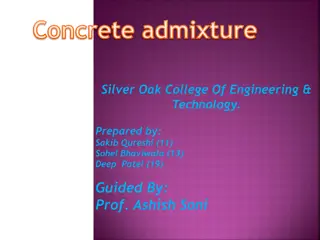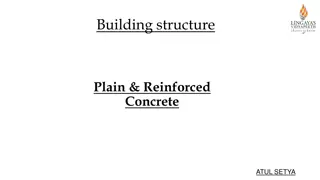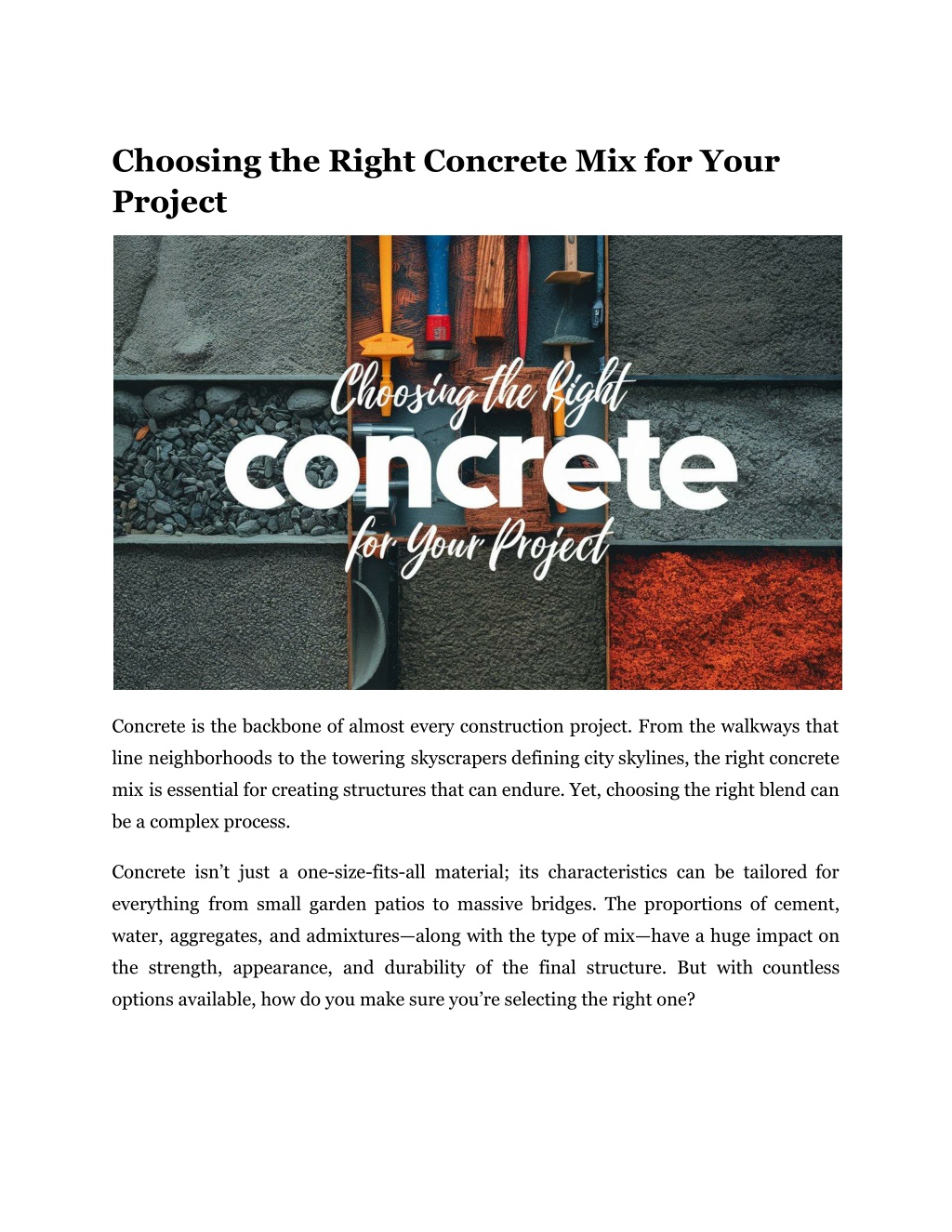
Choosing the Right Concrete Mix for Your Project_
Find the ideal concrete mix for any project. Get tips on strength, durability, and the best mix types to ensure quality results.
Download Presentation

Please find below an Image/Link to download the presentation.
The content on the website is provided AS IS for your information and personal use only. It may not be sold, licensed, or shared on other websites without obtaining consent from the author. Download presentation by click this link. If you encounter any issues during the download, it is possible that the publisher has removed the file from their server.
E N D
Presentation Transcript
Choosing the Right Concrete Mix for Your Project Concrete is the backbone of almost every construction project. From the walkways that line neighborhoods to the towering skyscrapers defining city skylines, the right concrete mix is essential for creating structures that can endure. Yet, choosing the right blend can be a complex process. Concrete isn t just a one-size-fits-all material; its characteristics can be tailored for everything from small garden patios to massive bridges. The proportions of cement, water, aggregates, and admixtures along with the type of mix have a huge impact on the strength, appearance, and durability of the final structure. But with countless options available, how do you make sure you re selecting the right one?
How to Choose the Right Concrete Mix for Your Project? Understanding Concrete Mix Basics Concrete is a composite material made up of cement, water, and aggregates, typically sand, gravel, or crushed stone. The properties of any concrete mix largely depend on the proportion and quality of these ingredients. The ratio of cement to water, for example, determines the strength and workability of the concrete, while the choice of aggregate impacts its density and appearance. The types of concrete mix generally fall into two categories: Standard mixes: These are basic mixes commonly used in residential applications, ideal for small-scale projects such as driveways, patios, and foundations. Specialty mixes: These are designed for unique applications or extreme conditions, including high-strength concrete for heavy structural work, and lightweight concrete for projects requiring easy handling or improved insulation. Key Factors to Consider When Selecting a Concrete Mix When choosing a concrete mix, several critical factors come into play, as each will influence the final product's durability, appearance, and functionality. Project Requirements The intended use of the concrete structure largely determines the type of mix you ll need. For instance, projects involving heavy loads, such as foundations or industrial flooring, will require a high-strength mix, while outdoor surfaces exposed to the elements may need a mix with higher durability against freeze-thaw cycles. Climate Conditions Environmental exposure also plays a key role in determining the right concrete mix. For structures located in colder climates, a mix with air-entraining agents is often
recommended to protect against freeze-thaw damage. Similarly, in hot climates, concrete mixes with water-reducing additives may be more suitable to prevent cracking due to rapid evaporation. Workability Workability refers to how easily the concrete can be mixed, placed, and finished. High workability is essential for intricate molds or densely reinforced structures, while low workability is typically suitable for straightforward, larger pours where strength is prioritised over ease of handling. Setting Time Setting time is the period concrete takes to harden, which can vary based on factors like cement type and temperature. Quick-setting mixes are useful for projects requiring rapid completion, such as repairs or areas with high traffic while standard-setting mixes allow for more work time in complex projects. Types of Concrete Mixes for Different Applications Different mixes cater to different needs. Here are some common types of concrete mixes and when to use each: Standard Mixes Standard concrete mixes are generally used for smaller-scale projects that don t require specialised properties. For example: Residential foundations: Typically use a standard mix with a strength of 3,000 to 3,500 psi (pounds per square inch). Driveways and sidewalks: Standard mixes around 3,500 to 4,000 psi offer good durability and strength for pedestrian use. Patios and floors: A standard mix with added aggregates can provide a smooth finish suitable for both indoor and outdoor applications.
Specialty Mixes Specialty mixes provide enhanced performance and are ideal for more demanding applications. Examples include: High-strength concrete: This mix has a compressive strength of 6,000 psi or more, making it ideal for high-load structures such as bridges, columns, and large-scale foundations. Lightweight concrete: Made with lightweight aggregates, this mix reduces structural load and provides better thermal insulation. It s commonly used in multi-story buildings and flooring. Fiber-reinforced concrete: Fibers such as steel, glass, or synthetic materials are added to increase tensile strength, making it suitable for structures with high impact or load resistance, such as parking garages. Assessing the Strength Requirements of Your Project Concrete strength is a primary factor in mix selection. Here s a breakdown of what to consider: Compressive strength: Measured in psi, compressive strength indicates how much pressure the concrete can withstand before failing. Residential projects usually require concrete with a strength of 3,000-4,000 psi, while commercial or industrial applications may need mixes upwards of 5,000 psi. Tensile strength: This is the resistance of concrete to breaking under tension. Adding reinforcements like steel bars or fibers can help improve tensile strength, making the structure more resilient to stress. Flexural strength: Flexural strength is critical in structures exposed to bending forces, such as beams and pavements. Specialty mixes with added reinforcements are typically used for these applications.
Choosing Aggregates and Admixtures for the Ideal Concrete Mix The choice of aggregates and admixtures also plays a significant role in concrete performance. Aggregates can vary from small pebbles to coarse crushed stones, and the selection impacts not only the appearance of the concrete but also its density and durability. Admixtures are added to the concrete to achieve specific properties: Water-reducing agents: Help improve strength and reduce water content, essential for high-strength concrete. Air-entraining agents: Increase durability in freeze-thaw conditions, making it suitable for outdoor applications. Accelerators: Speed up the setting time, ideal for projects requiring rapid completion. Retarders: Slow down the setting process, allowing more work time in complex projects or hot climates. Concrete Mix Considerations for Different Project Scales Project size is another consideration when selecting a concrete mix. For smaller, residential projects, a standard mix produced on-site may be sufficient. However, for large-scale or commercial projects, using high-quality concrete mix can save time and ensure consistency across the entire project. While standard concrete mixes are practical for straightforward projects, the versatility of ready mix concrete provides greater flexibility in meeting specific project needs and ensures that the material is prepared precisely to specification, enhancing structural integrity and durability.
Takeaway Selecting the right concrete mix is an essential step in achieving a durable, resilient structure that meets the specific requirements of any project. The right mix can help your structure withstand the test of time, adapting to load demands, climate conditions, and intended use. With a well-chosen concrete mix, you can ensure a strong foundation for success one that not only meets today s construction standards but also supports long-lasting and sustainable development. Site Article: Choosing the Right Concrete Mix for Your Project?


